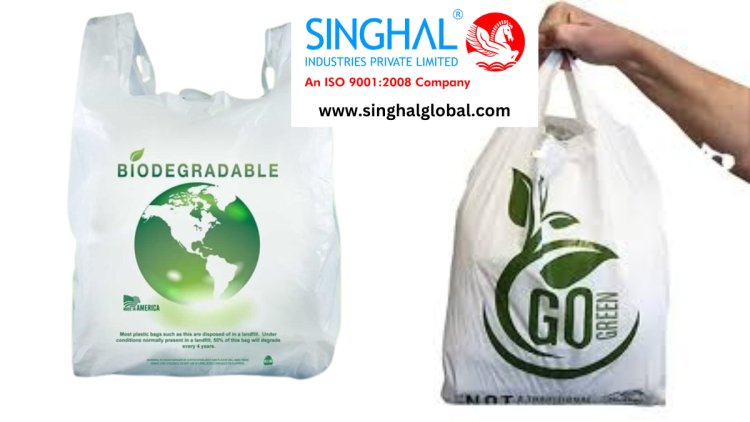Understanding Biodegradable Plastic Bags: A Sustainable Choice for the Future
Biodegradable plastic bags, including biodegradable polythene bags and bio plastic bags, offer a promising alternative to traditional plastics, contributing to reduced environmental impact and more sustainable resource use. While they provide significant benefits, such as faster decomposition and lower reliance on fossil fuels, proper disposal and consumer education are essential to maximize their advantages. As awareness and technology continue to evolve, biodegradable plastic bags represent a step toward more sustainable practices in waste management and environmental stewardship.
Share this Post to earn Money ( Upto ₹100 per 1000 Views )

Biodegradable plastic bags have emerged as a vital alternative to traditional plastic bags, offering a more sustainable solution to the environmental challenges posed by plastic waste. With growing awareness about environmental impacts, the use of biodegradable polythene bags and bio plastic bags is gaining momentum. This article explores the characteristics, benefits, and practical aspects of biodegradable plastic bags, shedding light on their role in reducing environmental pollution and promoting sustainability.
What Are Biodegradable Plastic Bags?
Biodegradable plastic bags are designed to break down more quickly than conventional plastic bags once disposed of. Unlike traditional plastics that can persist in the environment for hundreds of years, biodegradable plastic bags are engineered to decompose through natural processes. This decomposition can occur under specific conditions, such as in composting facilities or natural environments.
Types of Biodegradable Plastic Bags
-
Biodegradable Polythene Bags: These bags are made from polythene plastic that has been treated with additives to facilitate biodegradation. The additives help the plastic break down into smaller fragments over time, which can then be further decomposed by microorganisms.
-
Bio Plastic Bags: Bio plastic bags are made from renewable plant materials, such as cornstarch, sugarcane, or potato starch. These bags are designed to decompose more readily than conventional plastics, both in industrial composting facilities and in natural environments. Bio plastic bags are often touted for their lower carbon footprint and use of renewable resources.
Benefits of Biodegradable Plastic Bags
-
Reduced Environmental Impact: One of the primary benefits of biodegradable plastic bags is their reduced environmental impact compared to traditional plastics. As these bags break down more quickly, they contribute less to long-term litter and plastic pollution. This can help mitigate the adverse effects of plastic waste on wildlife and ecosystems.
-
Enhanced Decomposition: Biodegradable polythene bags are designed to decompose more efficiently under specific conditions. For instance, biodegradable polythene bags can break down in composting facilities, where the process is accelerated by controlled temperature, moisture, and microbial activity.
-
Sustainable Resource Use: Bio plastic bags, made from renewable plant materials, support a more sustainable approach to resource use. By utilizing plant-based materials rather than fossil fuels, bio plastic bags can help reduce dependency on non-renewable resources and lower greenhouse gas emissions.
-
Compatibility with Recycling: Some biodegradable plastic bags are designed to be compatible with existing recycling systems. This means they can be processed alongside conventional plastics in certain recycling facilities, further contributing to waste reduction efforts.
Practical Considerations
While biodegradable plastic bags offer significant environmental benefits, there are practical considerations to keep in mind:
-
Proper Disposal: For biodegradable plastic bags to break down effectively, they need to be disposed of under the right conditions. Biodegradable polythene bags, for example, require specific conditions found in industrial composting facilities. If disposed of in regular landfills or environments lacking proper conditions, their degradation process may be slower.
-
Consumer Awareness: Educating consumers about the proper use and disposal of biodegradable plastic bags is crucial. Understanding how and where these bags should be disposed of can maximize their environmental benefits and reduce confusion about their disposal.
-
Cost and Availability: Biodegradable plastic bags can sometimes be more expensive than traditional plastic bags. However, the long-term environmental benefits and potential regulatory incentives may justify the investment for many businesses and consumers. Availability may also vary depending on the region, so sourcing these bags from reputable suppliers is essential.
FAQs
1. How do biodegradable plastic bags differ from traditional plastic bags?
Biodegradable plastic bags differ from traditional plastic bags primarily in their decomposition process. Traditional plastic bags can take hundreds of years to break down and may fragment into microplastics, contributing to long-term pollution. In contrast, biodegradable plastic bags are designed to decompose more quickly under certain conditions, reducing their environmental impact. This decomposition can occur through chemical, biological, or enzymatic processes that facilitate the breakdown of the material.
2. Are biodegradable plastic bags truly environmentally friendly?
Biodegradable plastic bags are generally considered more environmentally friendly than traditional plastic bags because they break down more quickly and reduce the persistence of plastic waste in the environment. However, their environmental impact depends on proper disposal. Biodegradable polythene bags need specific conditions to decompose effectively, and bio plastic bags require proper composting facilities. Without these conditions, the benefits may be diminished. Overall, while they represent an improvement, reducing overall plastic use and adopting sustainable practices are also crucial.
3. Can biodegradable plastic bags be recycled?
The recyclability of biodegradable plastic bags depends on the specific type and the recycling facility. Some biodegradable bags, particularly those made from bio plastics, may not be compatible with conventional recycling systems and may need to be processed separately. However, certain biodegradable plastic bags are designed to be compatible with recycling systems, allowing them to be recycled alongside traditional plastics. It’s important to check local recycling guidelines and facilities to determine the best disposal method for biodegradable plastic bags.














